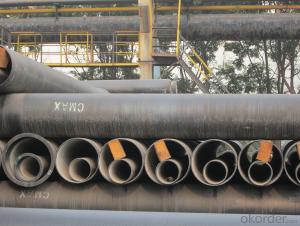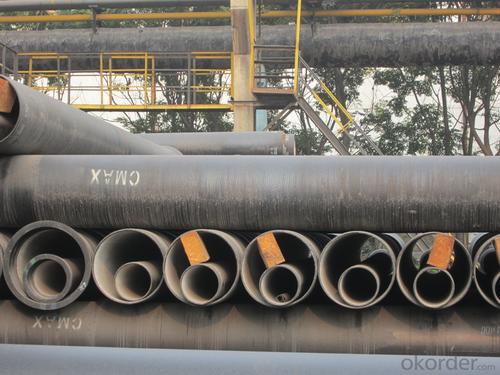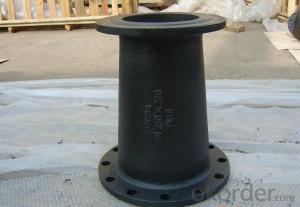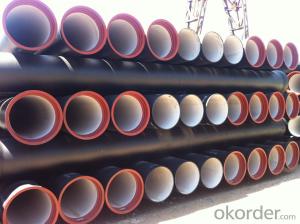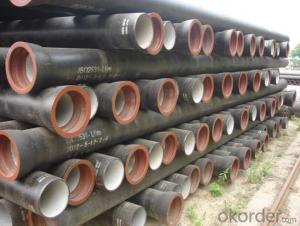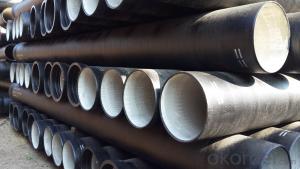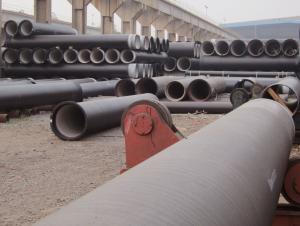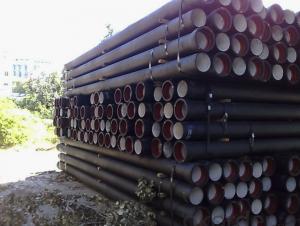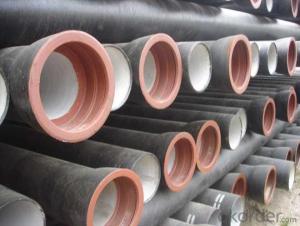Ductile Iron Pipe of China DN250 EN545/EN598/ISO2531 High Quality
- Loading Port:
- China main port
- Payment Terms:
- TT or LC
- Min Order Qty:
- 20 m.t.
- Supply Capability:
- 200000 m.t./month
OKorder Service Pledge
OKorder Financial Service
You Might Also Like
1,Ductile Iron Pipe Description :
1) Pipes confirm to ISO2531,K9 class,T type joint,6m long,with inside cements lining conform to ISO4179, outside Zinc spraying(130g/m2) and bitumen coating(70μm) conform to ISO8179.
2) Pipe ends: Spigot and socket ends, with 100% SBR rubber gaskets accoding to ISO4633
3) we can do third party inspection according to customer's request.
4) Our products have been sold to many international market,such as Middle East and South East Asia and Africa.
2,Main Features of the Ductile Iron Pipe:
·High yield strength
·High tensile Strength
·High corrosion resistance
·Pressure Resistence
·Anti-corrosion
·Installation is convenient
·Satisfy the highest hygienic standards
3,Ductile Iron Pipe Images:
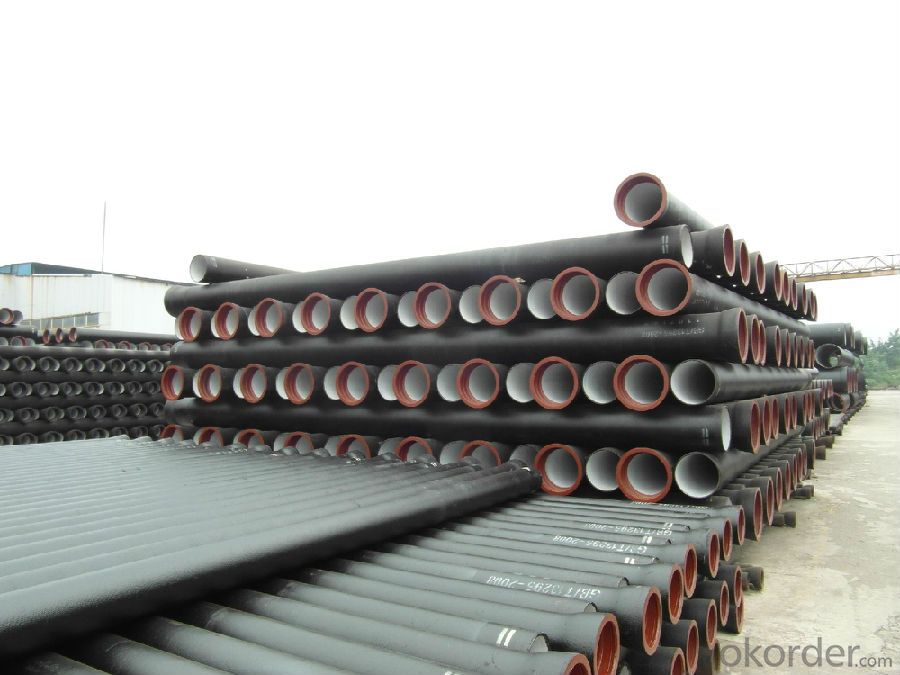
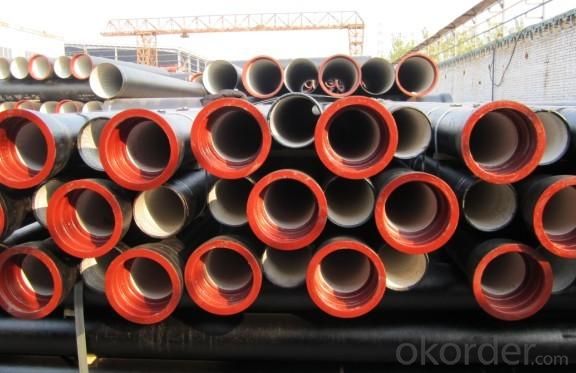
4. Ductile Iron Pipe Specification
Material: Ductile iron grade 500-7/ 450-10 in accordance with ISO1083
Standard: ISO 2531, EN545, EN598, ANSI, AWWA
Certificate: ISO9001, ISO14001, SGS, NSF, WRAS
Test: In accordance with ISO 2531 / EN 545 / EN598 and 100% water pressure test
Length: 6m or cut into 5.6m, 5.7m, 5.8m
Internal Lining: Cement, conform to ISO4179
External coating: Zinc + Bitumen, conform to ISO8179
Rubber: NBR, SBR, EPDM according to ISO4633 / EN681.1
Note: The gaskets, bolts & nuts are supplied respectively as your special requirement
5.FAQ:
We have organized several common questions for our clients,may help you sincerely:
1.Q: Why would you choose ductile iron pipe rather than other pipe materials?
A:The reasons are obvious for that not only ductile iron pipe possesses the inherent strength and flexibility of ductile iron, combined with proven corrosion protection systems, but also the cost savings can be achieved from design to installation and commissioning.
2.Q:Why can you guarantee the inner of pipes can’t be corroded?
A: High alumina cement mortar lining and sulphate-resistant cement mortar lining. These two special linings are applicable to inner anti-corrosion for sewage pipes, improving resistance to erosion of the sewage components.
- Q: Do ductile iron pipes require internal lining for potable water applications?
- Yes, ductile iron pipes do require internal lining for potable water applications. This is because the iron used in these pipes can react with the water and potentially contaminate it. Internal lining acts as a barrier between the water and the iron, preventing any chemical reactions and ensuring the water remains safe for consumption.
- Q: Can ductile iron pipes be used for irrigation canal lining?
- Yes, ductile iron pipes can be used for irrigation canal lining. Ductile iron pipes are known for their strength, durability, and resistance to corrosion, making them suitable for various applications including irrigation systems. They can withstand the pressure of water flow and provide a reliable and long-lasting solution for canal lining in irrigation projects.
- Q: How is ductile iron pipe recycled?
- Ductile iron pipe is typically recycled through a process called reclamation. This involves collecting the used pipe, cleaning and removing any impurities, and then melting it down to form new ductile iron products. The recycled ductile iron can be used to manufacture various items such as new pipes, fittings, and construction materials, providing a sustainable and environmentally-friendly solution for its disposal.
- Q: How does ductile iron pipe perform in areas with high soil corrosivity?
- Ductile iron pipe performs exceptionally well in areas with high soil corrosivity due to its inherent corrosion-resistant properties. The material used in ductile iron pipes is specifically designed to withstand harsh soil conditions, including those with high levels of corrosive elements. One of the main reasons why ductile iron pipe is suitable for areas with high soil corrosivity is its protective coating. Most ductile iron pipes are coated with a layer of cement mortar or a polyethylene sleeve, which acts as a barrier between the soil and the pipe. This coating not only prevents the soil from coming into direct contact with the iron, but it also provides an additional layer of protection against corrosion. Furthermore, ductile iron itself is a highly corrosion-resistant material. It contains a higher percentage of carbon compared to traditional cast iron, which improves its strength and durability. The carbon content also forms a protective layer of graphite within the iron matrix, which acts as a natural barrier against corrosion. In areas with high soil corrosivity, ductile iron pipes have been proven to have a long service life, often exceeding 100 years. This is due to their ability to resist corrosion and maintain structural integrity even in harsh environments. Additionally, ductile iron pipes have a high resistance to external loads and can withstand the stresses associated with high soil corrosivity. Overall, ductile iron pipe is an excellent choice for areas with high soil corrosivity. Its corrosion-resistant properties, combined with protective coatings, ensure that the pipe remains durable and reliable even in the most challenging soil conditions.
- Q: Can ductile iron pipes be used for high-pressure applications?
- Yes, ductile iron pipes can be used for high-pressure applications. Ductile iron has excellent strength and durability, making it suitable for handling high-pressure conditions. Additionally, ductile iron pipes have a higher pressure rating compared to other materials, making them a reliable choice for high-pressure applications.
- Q: What does ductile iron pipe "ND200" mean?
- The tube is thin from the metal tube, and the outer diameter of the tube is almost the same as the inner diameter of the tube, so the average value of the outer diameter of the tube and the inner diameter of the pipe is called the diameter.
- Q: How do ductile iron pipes handle ground movement due to tree roots?
- Ductile iron pipes are known for their strong and durable nature, making them highly resistant to ground movement caused by tree roots. The flexibility of ductile iron allows it to withstand the pressure exerted by growing tree roots without fracturing or breaking. This is due to the material's ability to absorb and distribute stress, which helps to minimize the impact of ground movement. Moreover, ductile iron pipes have a smooth inner surface that minimizes the chances of tree root intrusion. The tightly sealed joints between the pipes also prevent roots from penetrating and causing damage. In instances where tree roots do manage to penetrate the soil and come into contact with ductile iron pipes, their resistance to corrosion provides an added advantage. Ductile iron pipes are coated with a protective layer that prevents the formation of rust and corrosion, ensuring their longevity and structural integrity. However, it is important to note that while ductile iron pipes are highly resistant to ground movement caused by tree roots, regular inspection and maintenance are still recommended. This allows for early detection and necessary repairs to be carried out if any root intrusion or damage is identified.
- Q: Are ductile iron pipes suitable for sewage treatment plants?
- Yes, ductile iron pipes are suitable for sewage treatment plants. Ductile iron pipes are known for their durability, strength, and corrosion resistance, making them ideal for handling the corrosive and abrasive nature of sewage. They can withstand high pressure and are capable of accommodating heavy loads and ground movements, making them a reliable choice for sewage treatment facilities. Additionally, their smooth interior surface minimizes friction, reducing the risk of clogs and improving the flow of wastewater.
- Q: Are ductile iron pipes resistant to environmental stress cracking?
- Yes, ductile iron pipes are highly resistant to environmental stress cracking.
- Q: Do ductile iron pipes have inner enamel?
- Internal enamel ductile iron pipe is yes, but now there is almost no market (except for special process requirements), in the civil construction market, new materials, new technologies, new technologies can be replaced, there are many.
Send your message to us
Ductile Iron Pipe of China DN250 EN545/EN598/ISO2531 High Quality
- Loading Port:
- China main port
- Payment Terms:
- TT or LC
- Min Order Qty:
- 20 m.t.
- Supply Capability:
- 200000 m.t./month
OKorder Service Pledge
OKorder Financial Service
Similar products
Hot products
Hot Searches
Related keywords
